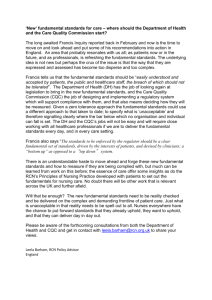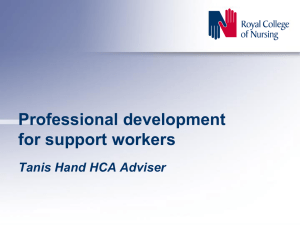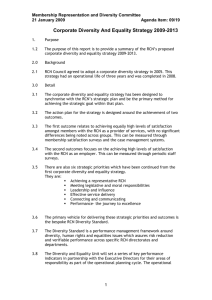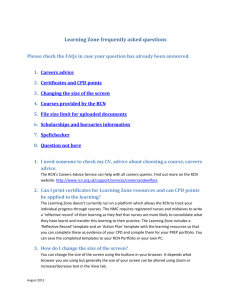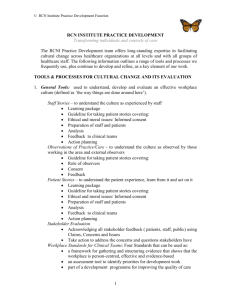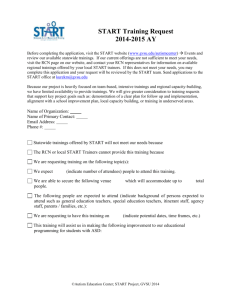10/51 International Committee report to Council
advertisement
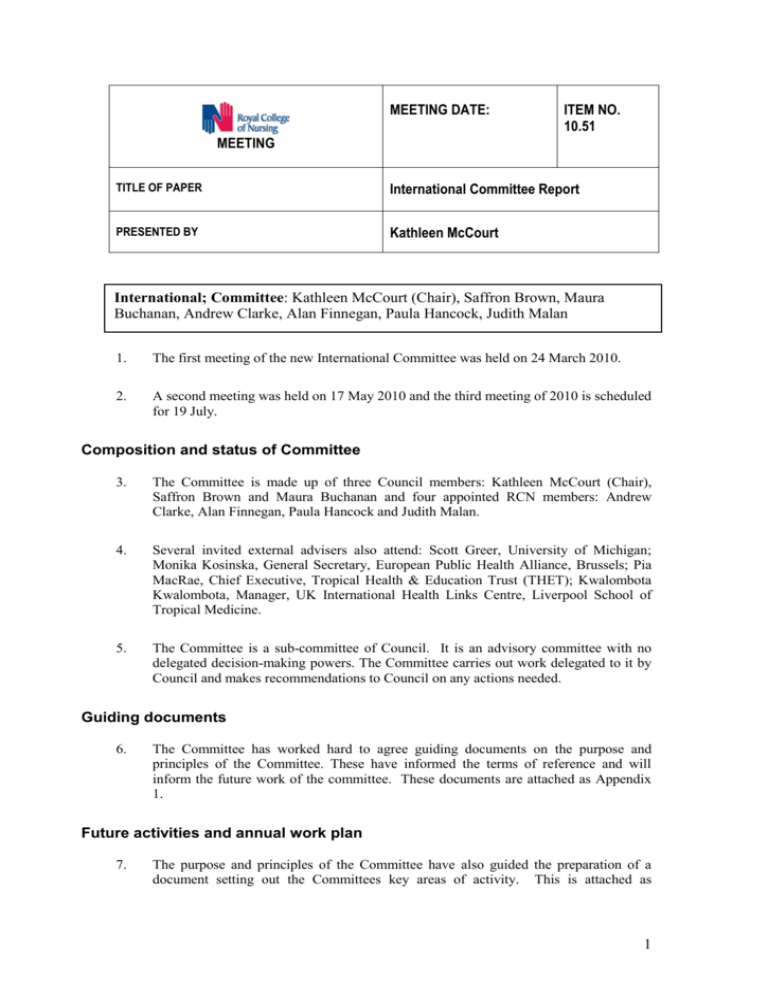
MEETING DATE: ITEM NO. 10.51 MEETING TITLE OF PAPER International Committee Report PRESENTED BY Kathleen McCourt International; Committee: Kathleen McCourt (Chair), Saffron Brown, Maura Buchanan, Andrew Clarke, Alan Finnegan, Paula Hancock, Judith Malan 1. The first meeting of the new International Committee was held on 24 March 2010. 2. A second meeting was held on 17 May 2010 and the third meeting of 2010 is scheduled for 19 July. Composition and status of Committee 3. The Committee is made up of three Council members: Kathleen McCourt (Chair), Saffron Brown and Maura Buchanan and four appointed RCN members: Andrew Clarke, Alan Finnegan, Paula Hancock and Judith Malan. 4. Several invited external advisers also attend: Scott Greer, University of Michigan; Monika Kosinska, General Secretary, European Public Health Alliance, Brussels; Pia MacRae, Chief Executive, Tropical Health & Education Trust (THET); Kwalombota Kwalombota, Manager, UK International Health Links Centre, Liverpool School of Tropical Medicine. 5. The Committee is a sub-committee of Council. It is an advisory committee with no delegated decision-making powers. The Committee carries out work delegated to it by Council and makes recommendations to Council on any actions needed. Guiding documents 6. The Committee has worked hard to agree guiding documents on the purpose and principles of the Committee. These have informed the terms of reference and will inform the future work of the committee. These documents are attached as Appendix 1. Future activities and annual work plan 7. The purpose and principles of the Committee have also guided the preparation of a document setting out the Committees key areas of activity. This is attached as 1 Appendix 2. This document has been prioritised to produce a work plan for 2010 and 2011 which is set out below: July International Alliances December Membership review – international affiliate/associate membership International development role EU mutual recognition review 2011 Advocacy agenda (priorities) The Committee will review its key activities and work plan at each meeting to ensure that emerging issues are captured and priorities addressed. Terms of reference 8. The terms of reference have been informed by the purpose and principles of the committee and are attached as Appendix 3 for approval by Council. 9. Council is asked to approve - the purpose and principles of the Committee set out in Appendix I the key activities set out in Appendix II and the priorities identified in paragraph 7 of the report the terms of reference at Appendix III. Kath McCourt Chair Originated by Emily Pollinger, Governance Adviser 2 Appendix I RCN INTERNATIONAL PURPOSE AND PRINCIPLES This paper proposes a reworded RCN international purpose and principles, based on the discussions and comments from the March 2010 inaugural International Committee meeting. INTERNATIONAL PURPOSE 1. Represent, advocate for and strengthen the status of the nursing profession internationally 2. Enhance patient care and health and wellbeing in the UK and elsewhere by improving professional policy and practice internationally 3. Improve the health of communities internationally by working with nursing and other organisations to shape health policies PRINCIPLES UNDERPINNING THE RCN’S INTERNATIONAL WORK enables demonstrates collaborative working, is sustainable/shows a especially with sister organisations positive impact over time is evidence based respects and values based on understanding of political, others economic and social context Seeks to do no harm e.g. demonstrates clear added value of careful scoping RCN engagement and cost effectiveness (These principles also incorporate some of the comments made in the March committee meeting on the five areas of activity and the suggested “do’s” and “don’ts” for the RCN). Members of International Committee are asked to approve the purpose and principles to recommend to Council Susan Williams Head of International Affairs May 2010 3 Appendix II KEY AREAS OF ACTIVITY TO ACHIEVE THE RCN INTERNATIONAL PURPOSE This paper provides a summary of the activities proposed at the March International Committee to achieve the RCN’s international purpose. It also shows where these fit with Council’s 2010/11 priorities, in addition to Council’s priority 4 to refocus international work in the RCN. It also integrates the draft 2011/2012 priorities KEY AREAS OF ACTIVITY 1) Developing and harnessing UK nursing expertise and experience to improve health outcomes globally 2) Addressing EU and international policies that impact on UK nursing and population 3) Learning from other countries to improve nursing and health in the UK 4) Strengthening nursing’s voice and influence globally 5) Supporting RCN as a business 6) Becoming an organisation that thinks globally SIX KEY AREAS OF ACTVITY 1) Developing and harnessing UK nursing expertise and experience to improve health outcomes globally (Council priority 3, nurse leaders, 7 membership review, 10 diversity) o Influence NHS strategically to support nursing participation in development links o Capacity build nursing based on RCN core skills: association building, leadership, learning and development, influencing, o Develop the RCN as an internationally accessible nursing ideas hub/think tank, including accessing RCN library and developing reciprocal arrangements (also developing RCN as a business) o Develop International associate/affiliate membership o Monitor and understand UK foreign and development policy and priorities and national health priorities of other countries relevant to the RCN 4 2) Addressing EU and international policies that impact on UK nursing and population (Council priority 5 stakeholder management, 6 research, 9 policy work, 11 workforce modernisation, 14, education, 15 quality and professional standards) Areas to consider under priority setting: EU – legislation/policies/good practice EU and future workforce/workforce planning Nurse education and mutual recognition legislation Quality and safety of healthcare and cross border care in EU EU four freedoms and tension with sustainability of health services in Europe e-health in Europe Nursing evidence for policy Public Health International – policies/guidance/good practice Health worker replacement/generic worker/task shifting Workforce mobility and shortages Population mobility Global economic crisis Chronic disease Emerging and re-emerging diseases Ageing/demographic change 3) Learning from other countries to improve nursing and health in the UK (Council priority 5 stakeholder management, 9 policy work, 11 workforce modernisation, 14, education, 15 quality and professional standards) Horizon scanning for opportunities and pitfalls Identify the common issues eg new roles, new pathways of care, /health and social care, professional boundaries, nurse education Support work of Council and priorities of policy committees Build/sustain international networks and alliances to access evidence and good practice Promote understanding of international relevance for nurses in media, and RCN communications – ‘What does it mean for me?’ Support Health Education for All (HIFA) 2015 and consider other ways RCN might contribute to bringing down cost of accessing high quality health care information. 4) Strengthening nursing’s voice and influence globally (Council priority 5 stakeholders) 5 Develop strategic alliances with organisations wider than nursing Widen membership of and develop future role of our key alliances ICN/EFN/CNF/EPSU-PSI Develop the international elements of the RCN website Work with and engage in mutual learning with other NNAs, including sharing and gaining recognition for nursing innovation and research work with UK Government, NGOs, EU, WHO, other international organisations to promote nursing’s contribution Map/find out where key nurses are working in international agencies/networks 5) Supporting RCN as a business (Council priority 7, membership review, 13 legal/governance review) Clearly identify RCN international public benefit versus for profit activity Develop RCN international marketing strategy Recognise and build on the added value of English as a marketable global language and RCN’s intellectual property maintain/develop RCN reputation and brand internationally Develop international associate/affiliate membership build on RCN consultancy service working with UK Government and NGOs, EU, WHO, other international organisations 6) Becoming and organisation that thinks globally (Council priority 4) and 2011 priority Integrate better our UK, EU and international policy work, at governance and operational level. Build a wider understanding of the impact of international policies and agencies on health at governance and staff level Engage in a high impact global health initiatives based on members’ choices/votes ACTIVITIES OUTSIDE THE RCN’S INTERNATIONAL SCOPE delivering direct patient care and services acting as an implementation development NGO 6 Appendix III Draft Terms of Reference: International Committee Role and Main responsibilities of the Group To develop an international strategy for the RCN and to oversee a work plan to deliver the priorities it identifies. To review this strategy and work plan regularly to take into account current issues. To ensure that the work of International Committee reflects the strategic objectives and priorities of the RCN and the RCN’s international purpose. To champion the international agenda within the RCN and to promote the role of the RCN and its impact on healthcare issues in the EU and internationally. To represent the international position in the decision making process and across the governance structure. To ensure that any projects commissioned by the Committee are delivered in accordance with the approved brief and to agreed timescales. Main Tasks 1. To report to the RCN Council after every meeting so that the priorities and concerns of the Committee are reflected in the decision making process of Council. 2. To represent, promote and support the policies and policy making processes of the RCN Council. 3. To develop ways of working to guide how other parts of the governance structure respond to international issues, and to advise on the value of international alliances and networks. 4. To advise when EU or international legislation will impact on RCN priorities and to influence the production of this legislation. 5. To recommend project bids for submission to the RCN Foundation and external funding bodies such as the Department for International Development, and to liaise with these bodies as appropriate. 6. To oversee the commissioning and delivery of priority work. 7. To contribute to the recruitment, retention and representation of international members within the framework agreed by RCN Council. 7


